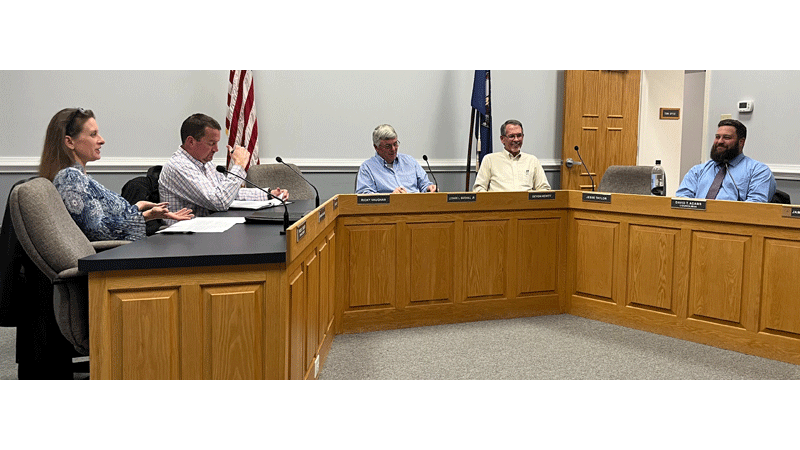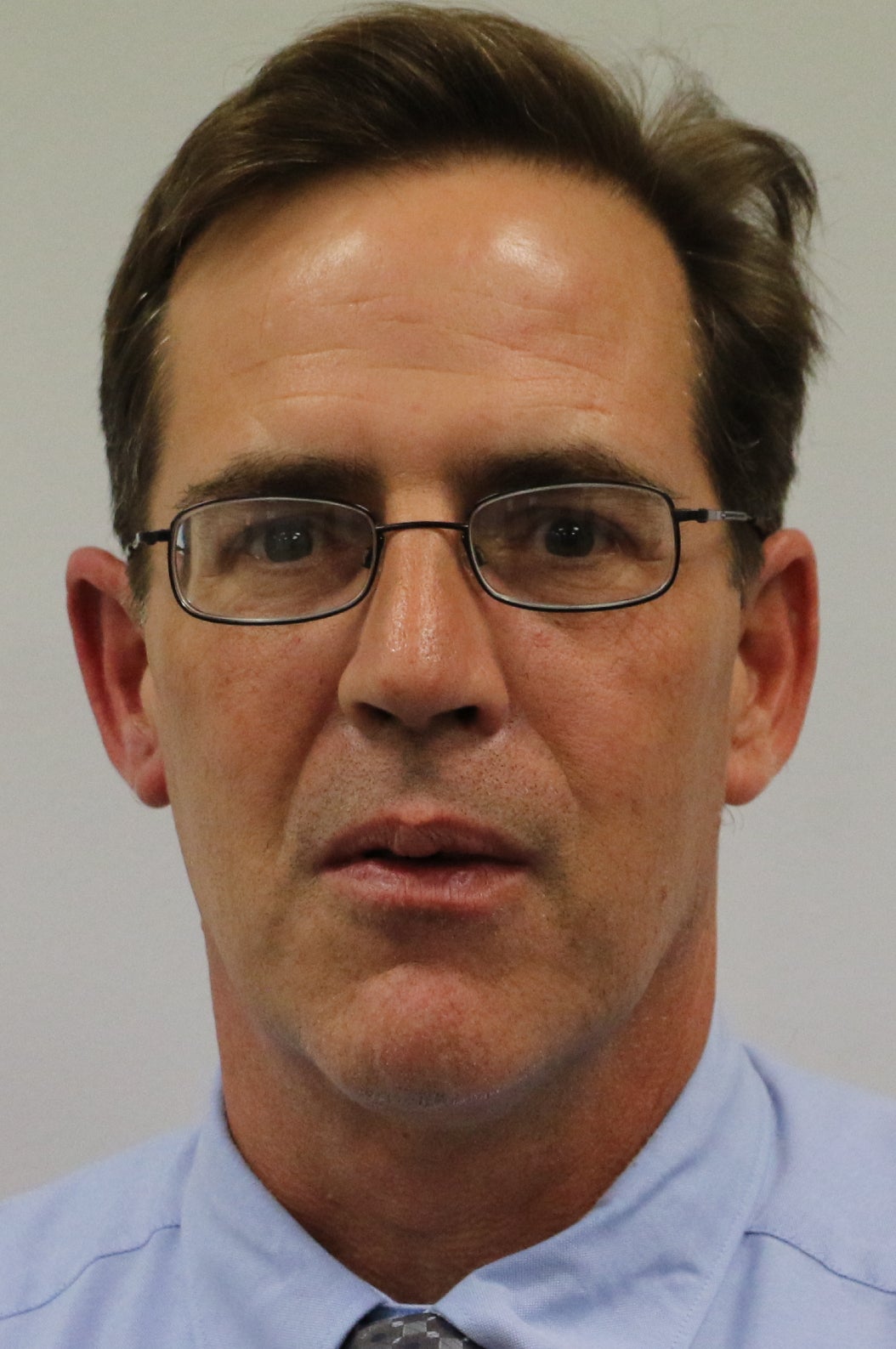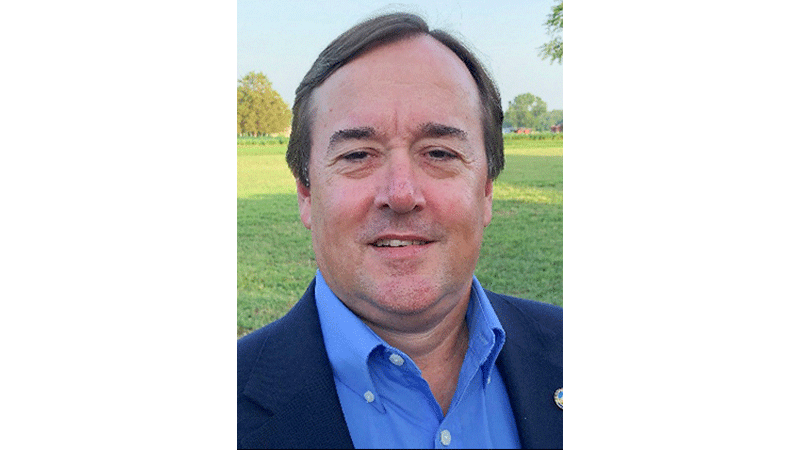Windsor Planning Commission sets schedule to review Comprehensive Plan
Published 6:12 pm Tuesday, February 14, 2023

- Members of the Windsor Planning Commission discuss the town’s Comprehensive Plan during a Jan. 25 commission meeting. Commissioners pictured are, from left, Larissa Williams, Dale Scott, Leonard L. Marshall Jr., G. Devon Hewitt and David T. Adams. (Photo by Titus Mohler)
|
Getting your Trinity Audio player ready...
|
Windsor Planning and Zoning Administrator James “Jay” Randolph recently presented a schedule to the Windsor Planning Commission for discussing the town’s Comprehensive Plan this year, and commissioners provided early feedback on that process.
Randolph said, “The plan is a great tool that the commonwealth of Virginia allows localities to (use) because this provides the framework for adjusting or revising the actual zoning ordinance or subdivision ordinance, the Capital Improvement Plan, to make the Comprehensive Plan actually into a working document versus just something we put on the shelf.”
At the Planning Commission’s Jan. 25 meeting, Randolph noted that during the course of 2022, the commission discussed updating the Comprehensive Plan.
“As you are aware, per state code, localities are required to review and update their plans at least every five years,” he said.
In a staff report found within the commission meeting packet, Randolph noted that the town’s current Comprehensive Plan was adopted in July 2016. However, with the onset of the COVID-19 pandemic and limited staff availability, an update did not occur in 2021. With full-time staff now available, it was the consensus of the commission to prepare an update of the plan beginning in 2023.
“We did discuss a little bit about the update of the plan last year during several of the meetings,” Randolph said. “It was, I believe, the consensus of the commission to just do a simplified update of the plan versus a complete re-work of it.”
He stated both at the meeting and in the report that the plan was prepared with assistance from the Hampton Roads Planning District Commission, but the HRPDC no longer offers support to member localities in the preparation of these plans.
“So it kind of leaves two choices — either to hire professional consultants or have staff prepare as much of it as possible with assistance from the commission,” he said. “The consensus, I believe, was to choose the latter, to save funds and utilize those limited funds we do have available in the best manner possible.”
THE SCHEDULE FOR REVIEWING/UPDATING THE PLAN
The adopted plan has eight individual chapters, along with a list of figures, tables and maps, he explained.
Randolph said now that he has settled back into the position as the town’s planning and zoning administrator, he feels comfortable enough to be the staff consultant helping update those chapters.
“So my proposal would be, during the spring of 2023, to look at chapters 1-4 — that’s population, housing, economy and transportation,” he said. “We did review some of the population numbers last summer that were available from the 2020 Census, and we did discuss, as part of the Town Council’s Strategic Plan, some of the planning items in there, and I think there was a very good discussion about including a lot more pedestrian facilities — sidewalks, bicycle paths, things of that nature. So we can incorporate a lot of those elements into the transportation plan.”
He proposed that in summer 2023, he and the commission could work through chapters 5-8, which would include community facilities, environment, land use, and goals and implementation strategies.
He noted that he thinks the future land use chapter is going to be the area where he and the Planning Commission spend the most time focusing on what they would like the town to be over the next 20 years.
“I would anticipate I would bring to the commission possibly one or two chapters at any given meeting, and we would read those chapters, consider changes to them and so forth,” he said.
As with any plan, public participation is crucial for its development and success in implementation, he stated in the report, adding that the town has public survey information that was provided during the creation of Windsor’s Strategic Plan that can also be utilized for inclusion in the Comprehensive Plan.
He also briefly listed some ways to engage the public, possibly during the summer and/or fall of 2023.
In the staff report, Randolph stated that with this preliminary schedule, it is anticipated that a draft Comprehensive Plan can be created by the end of the calendar year, with a formal public hearing being held by the commission in early 2024. After recommendation by the commission in early 2024, the Windsor Town Council can hold a public hearing and consider adopting the updated plan.
“So with all that being said, this is just kind of a rough outline of the schedule, and I just want to get feedback from the Planning Commission,” Randolph said.
Commissioner Larissa Williams said Randolph’s schedule sounded good.
“One to two chapters a meeting sounds very doable,” she said. “Do you have a suggested start date? March, April, next month?”
“I would imagine by March the first draft chapters, probably the population and the housing, would be able to be presented to the Planning Commission,” Randolph replied.
HOW TO ENGAGE THE PUBLIC
Randolph and the commission spent some time discussing ways to involve the public in the process of reviewing and updating the Comprehensive Plan after Commissioner Dale Scott asked Randolph to share his thoughts on the subject.
“From a staff level, we were looking at just a simplified survey,” Randolph said, confirming that this would be for all town residents. “And that’s something we may be able to do through water bills, although not everybody’s on the town water system, and/or making that available possibly through the town’s website.”
Randolph then highlighted how the town has some limited funds available that were budgeted in this current budget cycle in the amount of $25,000 that would be available to the commission for the development of the plan.
“So some of those monies could be used for the development of a survey and/or (to put) something onto the website if we have to get a consultant to actually place that onto the website or help us tailor it to make it accessible for folks,” he said.
“And then I would also think maybe a public open house sometime maybe later in the year prior to the public hearing, maybe during the summertime when we get into the future land use, just to allow people to actually come to the Town Hall, look at some maps, make some comments before we get too far out in front of it and say, ‘We think these are the best maps in the world or the best ideas,’ and then the public’s like, ‘No, we’re not really in tune to that.’”
Commissioner David T. Adams said that if the town holds an open house, he would recommend having it at the Windsor Town Center.
“Make it interactive, let people engage, and then if you give people food, people will show up for the food,” he said. “So maybe that’s an option as well is to get people to come out to contribute to the plan, because I know in Windsor Woods, people want sidewalks for sure, but they might not understand all the intricacies of what goes into that.”
Randolph affirmed that money was available to help fund that idea, and he also mentioned earlier in the meeting how the funds could help with visual displays.
“We do have some funds available that we might be able to utilize Isle of Wight County (Geographic Information System) for some of the maps and things of that nature at very limited cost with those,” he said.
Williams suggested pairing a public engagement opportunity with a community event, using as an example Driver Days, a festival put on by a nearby Suffolk community.
“We’ve even been talking for a while about having something that gets the town more involved in everything and is also fun at the same time, so maybe we could kill two birds with one stone, come up with Windsor Anniversary or something, Windsor Days,” she said.
She said a model of the town of Windsor could be set up, or there could be a competition at Windsor High School in which students are challenged to come up with a design for how they envision the town 20 years from now, stoking interest in engineering and other fields involved in such an endeavor.
“I’m just spitballing,” she said.
Another commissioner suggested that the Planning Commission could provide a scholarship in connection with such a competition.
“That brings up a very important point,” Randolph said. “We have two schools here in town, and I don’t know if younger people really think 20 years into the future, but it’s a great opportunity to try to involve that. We have both those assets right here in town.”
Adams said, “I want to find the ones that are thinking that far ahead.”
“This is how we get them to come out of the woodwork,” Williams added.
WHAT COULD BE WORKED INTO THE PLAN
Randolph asked commissioners if there were any other initiatives they would like to see worked into the eight existing chapters of the Comprehensive Plan.
Williams asked if such an addition could include addressing the town’s internet and the exclusivity deal that it has with Spectrum.
“That’s certainly a possibility,” Randolph said. “That could fall under community facilities as far as having more competition or other providers available to the town — that’s something we can certainly consider.”
“Yes, please,” Williams said. “Do we have any idea how long that exclusivity agreement was for?”
Randolph said he did not know but that he could look into it.






